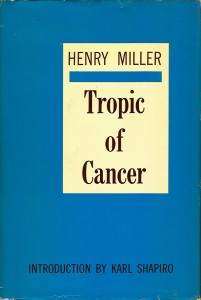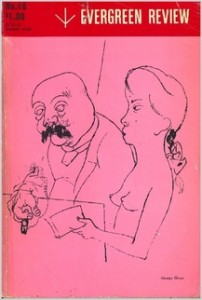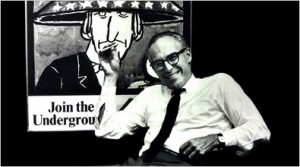Grove Press Publisher Barney Rosset, Champion of Free Speech, Dies
Posted on February 23, 2012
Filed Under Books, Culture, Main, People | Leave a Comment
In 1963 — still a fresh-faced high school student just beginning to feel the need to step out and express myself, to maybe “revolt” against the staid and stunting middle-class rules and regulations that governed my school and social life — I was working on my uncle Mort’s parking lots in Los Angeles and Beverly Hills. Parking cars could be fun — especially if someone pulled up in a Ferrari or a Corvette and I got a chance to “drive” it from one end of the parking lot to the other before pulling into an empty space (unlike the parking lot attendants in “Ferris Bueller’s Day Off,” our cars never left the lot).
 But the most fun I had was during my lunch hour, when I would jump into my 1957 Chevrolet station wagon and grab my hidden copy of Henry Miller’s “Tropic of Cancer,” published by the Grove Press. “Tropic of Cancer” was a banned book — deemed obscene, it was forbidden to be sold in most cities around the country, including Los Angeles — I bought my copy in Beverly Hills. Miller’s autobiographical adventures in the Paris of the 1930s was nothing short of enlightening — his ribald life of sex, love and art quickly opened my mind to a new world that was diametrically opposed to my antiseptic life in West Los Angeles.
But the most fun I had was during my lunch hour, when I would jump into my 1957 Chevrolet station wagon and grab my hidden copy of Henry Miller’s “Tropic of Cancer,” published by the Grove Press. “Tropic of Cancer” was a banned book — deemed obscene, it was forbidden to be sold in most cities around the country, including Los Angeles — I bought my copy in Beverly Hills. Miller’s autobiographical adventures in the Paris of the 1930s was nothing short of enlightening — his ribald life of sex, love and art quickly opened my mind to a new world that was diametrically opposed to my antiseptic life in West Los Angeles.
I never gave a thought to the man who published “Tropic of Cancer,” but his name was Barney Rosset, and he died Tuesday in Manhattan at 89. Some people, like Job, raise their fists against the gods and assert their power of humanity against the forces of moral and political repression. Rosset was one of those. Born into a wealthy Chicago family, he was sent to several liberal schools where he quickly overcame his father’s conservative leanings. “I’m half-Jewish and half-Irish,” he told The Associated Press in 1998. From an early age my feelings made the I.R.A. look pretty conservative. I grew up hating fascism, hating racism.”
After attending the University of Chicago and UCLA, and after a stint in the Army and the Communist Party, he headed off for Paris with former high school classmate Joan Mitchell, who by this time had become a well-known Abstract Expressionist painter. They were married in 1949 and returned to the States, where he attended the New School for Social Research.
In 1951 he bought a small, struggling press on Grove Street in Greenwich Village for $3,000 and immediately began to champion the Beat poets, French Surrealists, German Expressionists Absurdists and counterculturalists. In 1957 Rosset launched The Evergreen Review, which became one of the most important magazines of the 1960s (I still have many of those original issues). The Evergreen Review lasted until 1973, publishing fiction, theatre pieces, essays, poetry (Allen Ginsberg’s “Howl” appeared in the second issue) and lascivious comic strips.
In 1959 Rosset first published the banned “Lady Chatterley’s Lover,” which was deemed “smutty” and barred from distribution through the U.S. mail by Postmaster General Arthur E. Summerfield; a federal judge lifted that ban. Next Rosset took on “Tropic of Cancer,” originally published in 1934 in Europe but banned in the U.S. He bought the rights in 1961 and published the book, which was quickly banned around the country; Rosset was even arrested and taken before a Brooklyn grand jury. In 1964 the U.S. Supreme Court overturned a Florida ban, and the floodgates were opened.
Rosset went on to publish William S. Burroughs’ “Naked Lunch,” “The Voyeur” by Alain Robbe-Grillet, work by Jean Genet, Samuel Beckett, the Marquis de Sade and a variety of other writers on the cutting edge of culture (Grove later branched out to include such titles as John Kennedy Toole’s” A Confederacy of Dunces,” Eric Berne’s popular “Games People Play” and “The Autobiography of Malcolm X”).
 Rosset also dabbled in films, distributing the banned Swedish sex film “I Am Curious (Yellow)” as well as the controversial 1968 “Titicut Follies,” Frederick Wiseman’s cinema verite expose of the abuse of mental patients at the Bridgewater State Hospital.
Rosset also dabbled in films, distributing the banned Swedish sex film “I Am Curious (Yellow)” as well as the controversial 1968 “Titicut Follies,” Frederick Wiseman’s cinema verite expose of the abuse of mental patients at the Bridgewater State Hospital.
Though the press was sold in 1985 and he was deposed as publisher, Rosset kept his hand in other publishing ventures, starting Foxrock Books and even publishing Evergreen Review online.
Rosset called Grove “a breach in the dam of American Puritanism,” and told NPR in 1991 that “anything should be — can be — published. I think that if you have freedom of speech, you have freedom of speech.
Barney Rosset, May 28, 1922 to Feb. 21, 2012.
Additional links:
Downloadable Evergreen Review back issues
Comments
Leave a Reply
